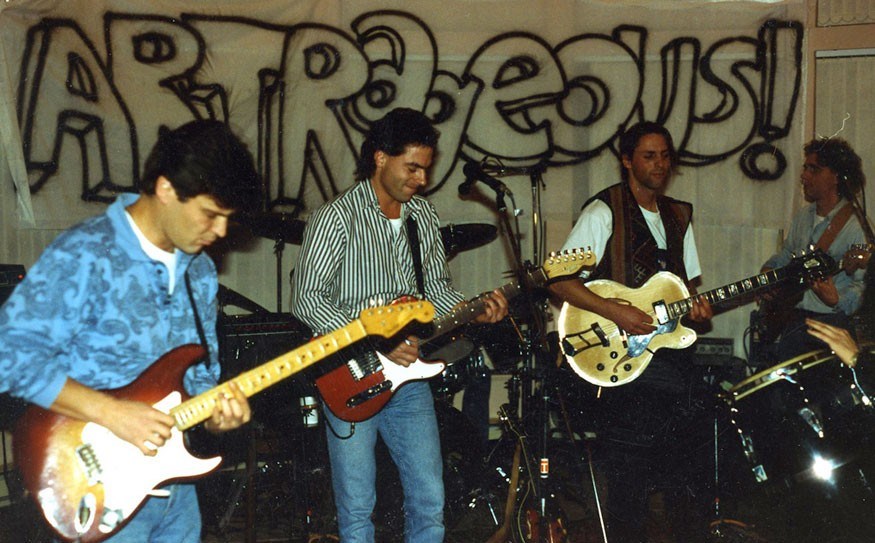It is nearly impossible to imagine a world without art.
Art is in everything around us from the crazy finger-painted masterpieces our kids create as toddlers, to the art we choose to decorate with, to the content in Pique.
It is something so intrinsic to the human condition that I think most of us give it little thought in our day-to-day lives.
As youngsters, many moan at having to do art projects in school, some take it in post-secondary institutions thinking it an easy credit — not true by the way — few have the courage to actually pursue it for a living.
But there is no escaping that art is part of who we are and how we have lived from the days of the caveman/woman to today.
As I pondered that and the amazing fact that this month marks the 30th anniversary of the Whistler Arts Council (WAC) I wondered about the role of art in our community, indeed in our way of life.
Why was it that a group of Whistler locals all those years ago decided that the budding ski resort needed to have art as part of its way of life?
In some ways the answer is simple — it was impossible to imagine that Whistler could grow without art in its many forms. Inconceivable in fact.
It was a way to make our home special.
This "Making Special" is in fact one of the key foundations of a lifelong study done by author and intellect Ellen Dissanayake, who has made it her life's work to look at the link between art, psychology, anthropology and ethology.
"We don't have a verb, 'to art,' but what are artists, dancers, poets doing?" she asked during an interview with the University of Washington Alumni magazine Columns.
"They're taking the ordinary and making it special. You create a bowl out of mud but you don't leave it ordinary, you make it special by engraving a pattern or figures on it. A poet takes ordinary words and makes them special. An artist places an activity or an artifact in a realm different from the everyday."
Isn't that indeed what we see when we look around Whistler? From the art that hangs in local restaurants and businesses for WAC's ArtWalk, to the murals painted on our bridges, to the whimsical "yarn bombs" we are all enjoying around town.
Then there are the storytellers and playwrights who regale us with tales of Whistler's past or poke fun at the present — and, of course, music and dance which are also part of Whistler's soul.
The story of our art is also the story of Whistler's transitions — it can be seen in how our artistic offerings have changed from the purely volunteer-based organizations, which led the charge in the '80s, to the multi-million dollar plans underway to reinvent some of our artistic offerings, both on the street, and through music and more.
At each of Whistler's transitional times you will find art in some form — and I would argue it is no different now as the resort continues to try and define itself in the post-Olympic era — a time we also find ourselves under tremendous economic pressure as the global economy struggles.
And as we have seen so many times in the past while various levels of government offer arts funding, there is not much policy to go with it.
At our municipal level, council has put $75,000 to develop a Comprehensive Community Cultural Plan, which is to provide a road map for the resort's cultural future— paid for out of the Resort Municipality Initiative (RMI) funding from the province.
The RMI is key to Whistler's plans for continued success as it applies to its festivals, events, and animation program.
Peer review is an important part of this process in examining not just the artistic success of the program, but also if it is fiscally wise in the circumstances — will bringing the VSO here for over $200,000 return the investment in spades to the resort? Let's hope so. And let's see the numbers of room nights booked for the concerts and hear from local businesses about what visitors spent around that event. Surely our arts and entertainment groups want to be striving for self-sufficiency? After all, the elephant in the room is how long the RMI funding will continue as the province itself copes with a tough economy and an aging population. This also begs the question if peer review should also be done by an independent organization, not by those who have a vested interest, as we have set up in Whistler.
Of course, achieving self-sufficiency is no easy feat — not back-in-the-day and not now.
And would we choose not to fund art in its many forms if it meant not having it at all? I don't think so. While we may not think about art every day, there is no doubt that it impacts us each and every day, and our worlds would be poorer if it was absent.
Whistler is fortunate beyond measure to have so many passionate people dedicated to the success of our resort's artistic culture — a culture that goes far beyond what is done for the visitor.
Our art and culture is about what is authentically Whistler — it's about readings at The Point, it is about the Children's Art Festival, it is about art in our school, our festivals and more, much more.
So while there is no doubt going to be hiccups along our path to cultural growth, here's to celebrating the first 30 years of WAC and the many, many years it finds success in the future — with all of our help.




